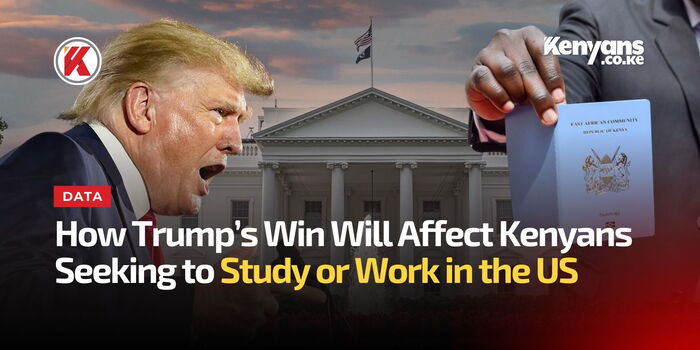Donald Trump is set to become the 47th President of the United States, with most projections showing him clinching an electoral victory, which will most likely send ripples of anxiety through Kenyan communities, particularly those with aspirations of studying or working in the United States.
The president-elect has indicated his intention to resurrect and expand upon the hardline immigration policies that defined his first term, a prospect that has sparked concern among Kenyans eyeing opportunities in America.
Why it matters: During his first term, Trump’s administration was marked by a string of hardline immigration policies. These included withdrawing from the Paris Climate Accord, imposing a travel ban on citizens from several Muslim-majority nations, and raising import tariffs. He made some headway on campaign promises like building a wall along the US-Mexico border and having Mexico foot the bill, but these ultimately fell short.
While some of these policies were challenged in court or met with resistance from government officials, Trump’s proposed plans for his second term paint a more extreme picture, leaving many worried about the future of US immigration.
President-elect Donald Trump during a past rally in October 2024.
Photo
Courtesy
Dig deeper: Trump has proposed to execute the “largest domestic deportation operation in American history” which should raise eyebrows among Kenyan immigrants. This operation, which aims to deport approximately 11 million undocumented migrants, would involve deploying military personnel to the US-Mexico border and authorizing Immigration and Customs Enforcement (ICE) raids on workplaces.
Such aggressive measures have the potential to create a hostile environment for all immigrants, regardless of their legal status, making the US a less attractive destination for Kenyans seeking opportunities abroad.
Adding to the trepidation is Trump’s intention to end birthright citizenship for children born to undocumented parents. This policy, which would require at least one parent to be a US citizen or lawful permanent resident for their child to gain automatic citizenship, could significantly impact Kenyan families hoping to secure a future for their children in the US. Currently, children born in the US to Kenyan parents on visas like the H-1B, which allows trained foreign workers to temporarily reside in the US, are automatically granted citizenship. With this potential change, the future for children of Kenyans working in the US becomes uncertain.
Kenyans already face significant challenges in obtaining US visas, particularly the coveted green cards that grant permanent residency. The current system, with its annual cap of 140,000 employment-based green cards and a per-country limit of 7 per cent, has resulted in a massive backlog, especially for Kenyan applicants. Given Trump’s stated aim to restrict both legal and irregular immigration, these backlogs are likely to worsen, pushing the American dream further out of reach for many Kenyans.
Trump’s expected focus on limiting the labor supply through immigration restrictions raises further concerns. During his first term, he implemented policies that blocked entry for immigrants and visa holders during the COVID-19 pandemic and created obstacles for foreign-born scientists and engineers seeking to work in the US. These actions were based on the “lump of labor fallacy,” a disproven economic theory that assumes a fixed number of jobs, meaning new workers inevitably displace existing ones.
Presidents William Ruto and Joe Biden during his arrival at the White House, May 2024.
Photo
PSC
A key area of concern for Kenyan students is the potential restriction of Optional Practical Training (OPT). OPT allows international students to gain practical work experience in their field for up to three years after graduation. During his previous term, Trump’s administration considered restricting OPT, particularly the 24-month extension granted to students in STEM fields. While this restriction was not implemented then, the possibility of its revival under a second Trump administration is a significant worry for Kenyan students hoping to leverage OPT to gain a foothold in the US job market.
Another potential hurdle for Kenyan students is the possibility of stricter H-1B visa policies. The H-1B visa is a common pathway for international students to transition from OPT to permanent employment in the US. During Trump’s first term, his administration implemented measures that raised denial rates for H-1B petitions, increased costs for employers, and created uncertainty around the visa program. While some of these measures were later deemed unlawful, the possibility of their return or the introduction of new restrictions could significantly impact Kenyan students’ chances of securing long-term employment in the US.
Trump’s proposed policies could also have unintended consequences for Kenyan professionals already working in the US on H-1B visas and waiting in the green card backlog. One proposed policy involves raising the minimum wage requirements for H-1B visa holders and employment-based immigrants, potentially pricing them out of the job market. Another potential issue is the possible curtailment of work authorization for spouses of H-1B visa holders. This policy, if implemented, would make it much harder for families to remain in the US while waiting for their green card applications to be processed.
What next: While Trump’s immigration policies have drawn criticism from various quarters, including human rights groups and legal experts, they resonate with a segment of the American population concerned about job security and national security. The former president’s promise to crack down on immigration has appealed to those who believe that immigrants are taking jobs from Americans and contributing to social problems.
Trump’s victory presents a challenging landscape for Kenyans aspiring to study or work in the US. The proposed immigration policies, coupled with the existing backlogs in the green card system, suggest a future where obtaining US visas and navigating the immigration process will be more difficult than ever.
While the full impact of Trump’s second term remains to be seen, it is clear that his presidency will have significant implications for Kenyan immigrants and students hoping to pursue their dreams in the United States
Kenyans receiving their passports at Nyayo House on May 13, 2024
Photo
Kithure Kindiki

























